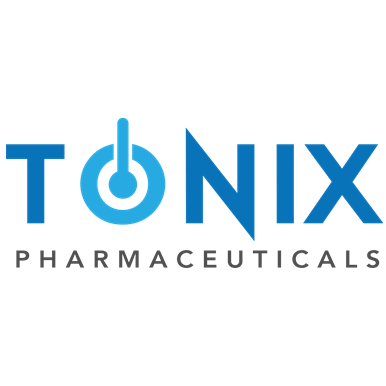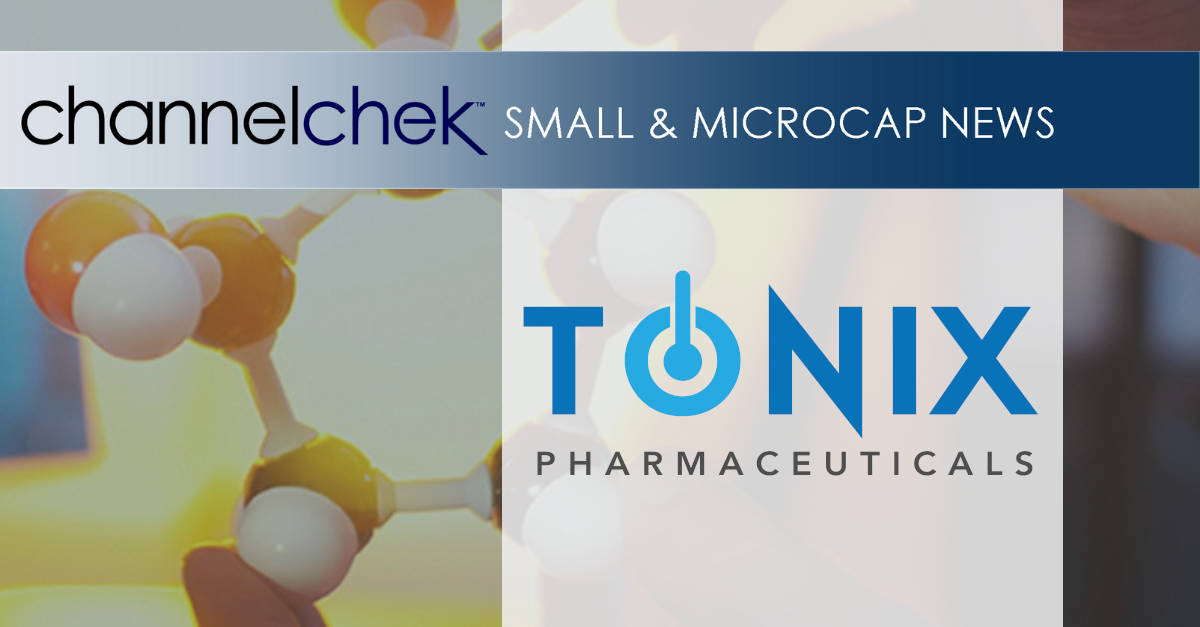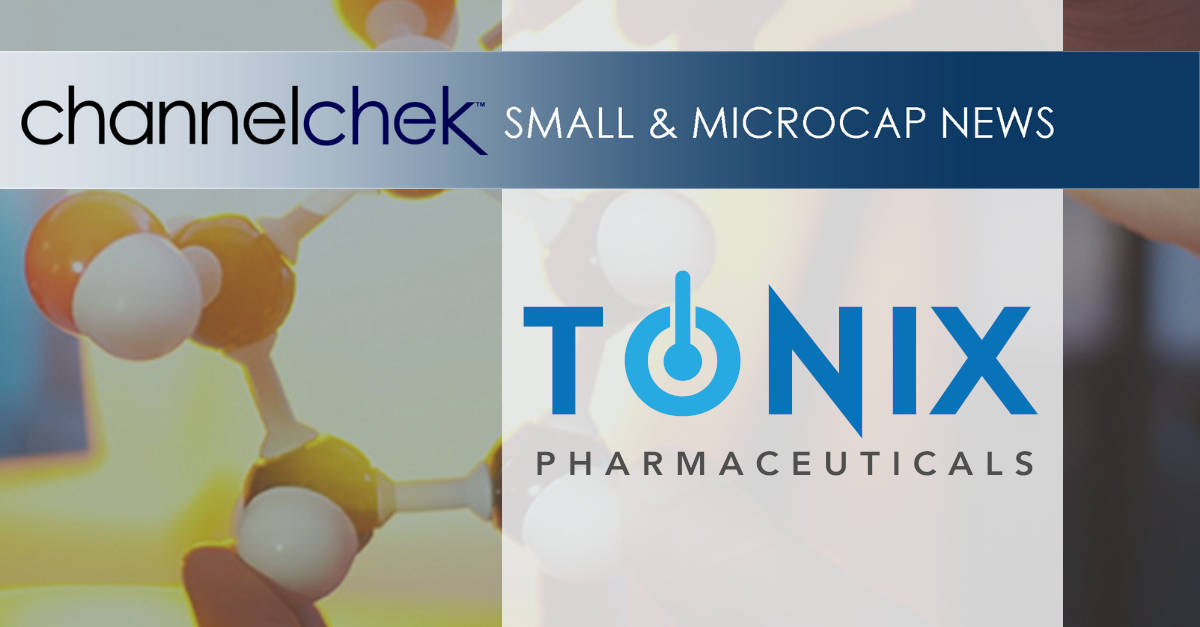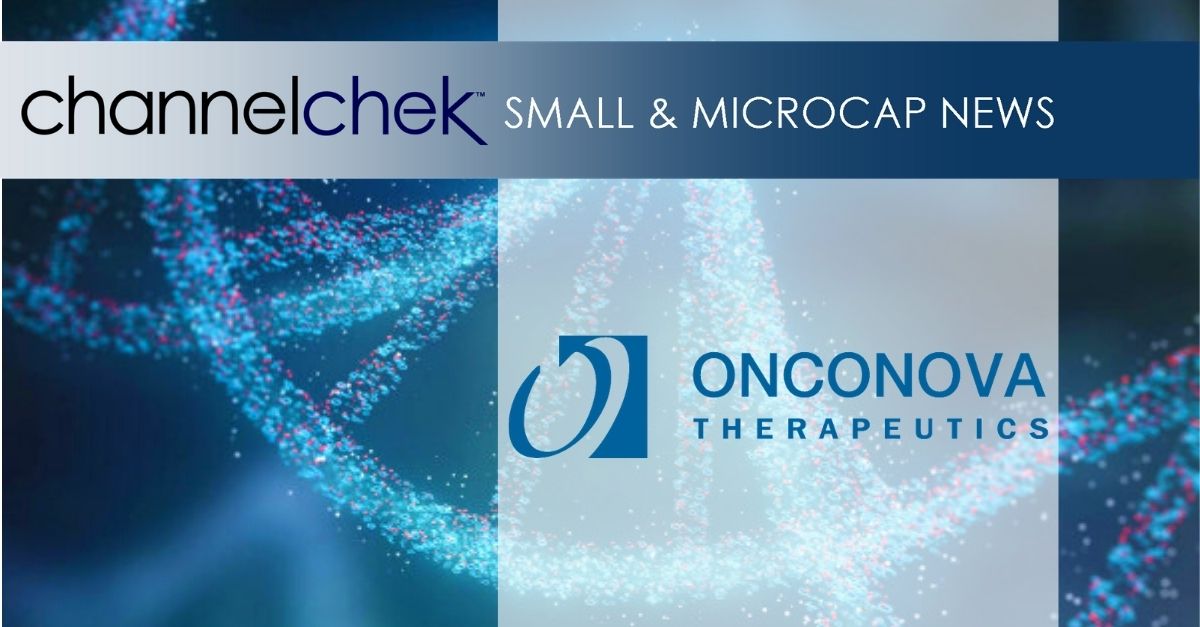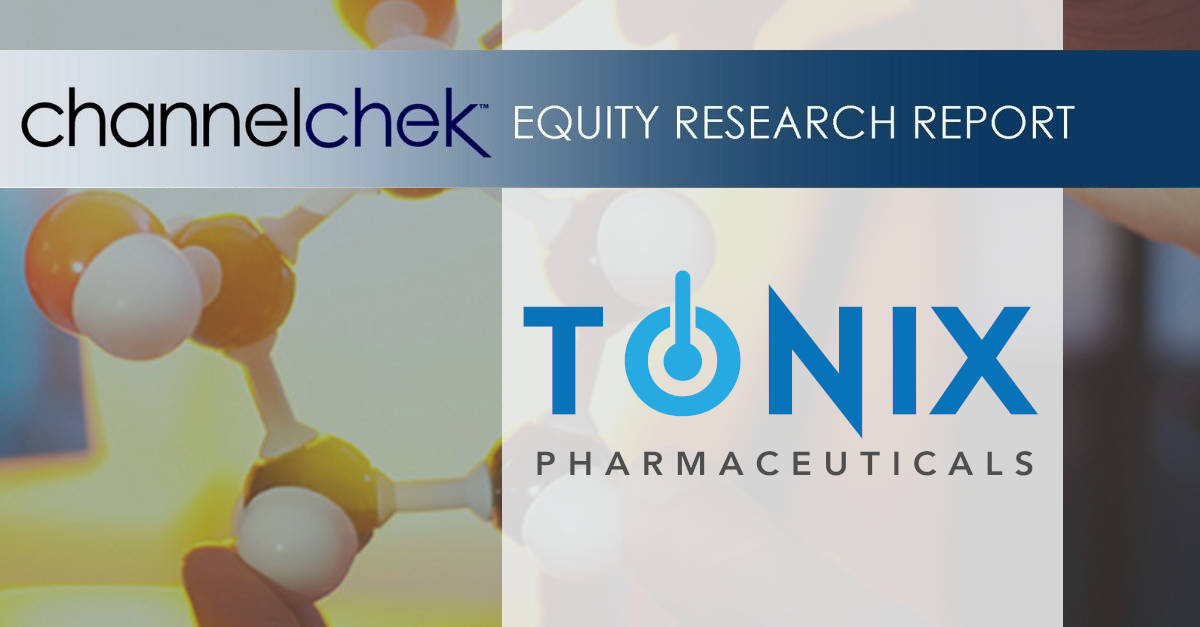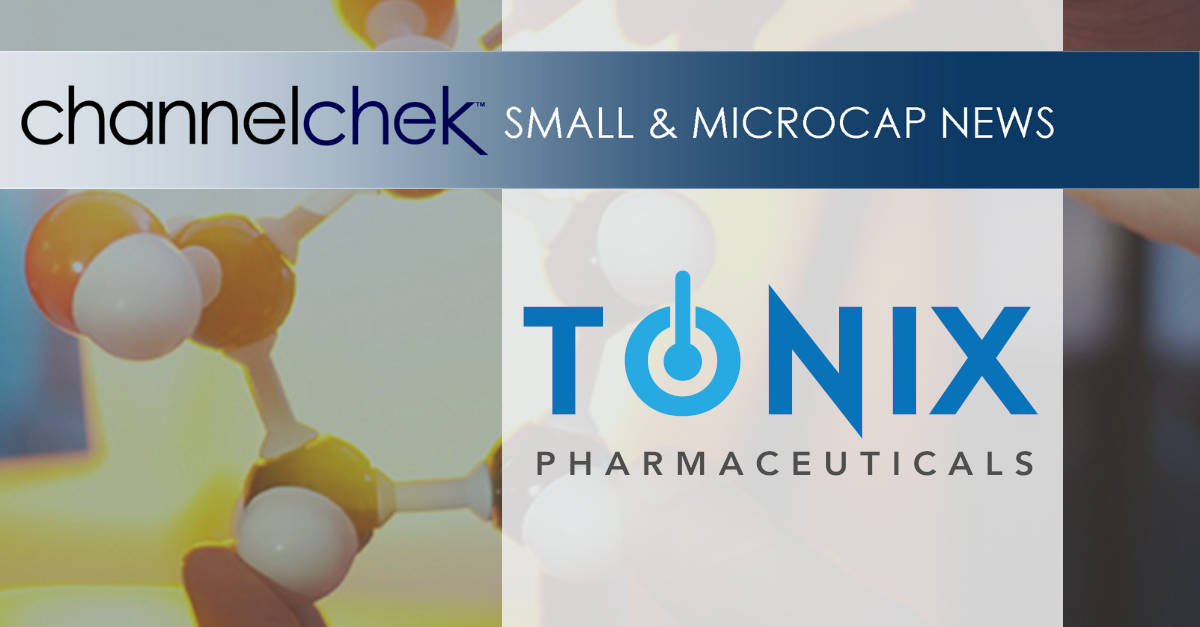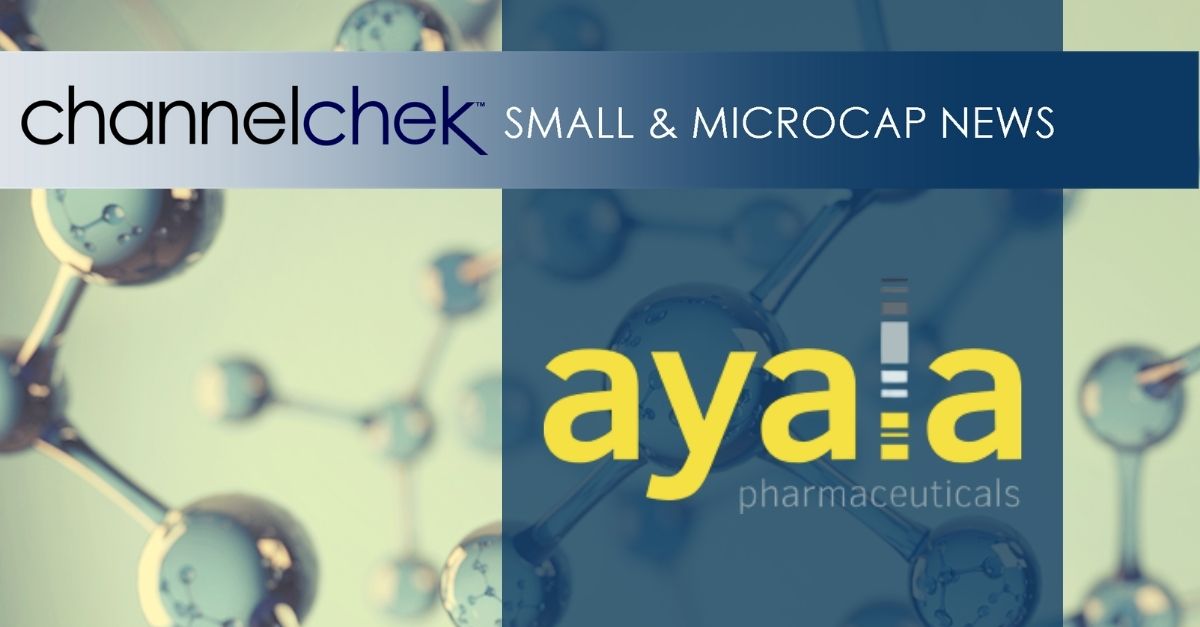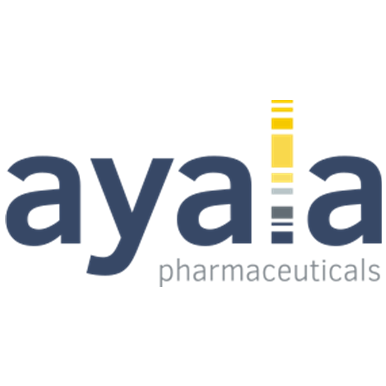Research, News, and Market Data on TNXP
October 03, 2022 7:00am EDT
TNX-601 ER, Tianeptine Hemioxalate, is an Extended-Release Tablet for Once-a-Day Dosing
Phase 2 Clinical Trial of TNX-601 ER Expected to Start First Quarter 2023
CHATHAM, N.J., Oct. 03, 2022 (GLOBE NEWSWIRE) — Tonix Pharmaceuticals Holding Corp. (Nasdaq: TNXP) (Tonix or the Company), a clinical-stage biopharmaceutical company, today announced the U.S. Food and Drug Administration (FDA) has cleared the Investigational New Drug (IND) application to support a Phase 2 clinical trial with TNX-601 ER (tianeptine hemioxalate extended-release tablets), a once-daily formulation of tianeptine as a potential treatment for major depressive disorder (MDD)1. Tianeptine is a new molecular entity in the U.S. that is being developed under the 505(b)(1) pathway. Tianeptine sodium (amorphous) immediate release (IR) tablets have been available in Europe and many countries in Asia and Latin America for the treatment of depression over more than three decades since it was first marketed in France in 1989. Tianeptine’s activity is mechanistically distinct from traditional monoaminergic treatments for depression available in the U.S. including the selective serotonin reuptake inhibitors (SSRIs), serotonin-norepinephrine reuptake inhibitors (SNRIs), monoamine oxidase inhibitors (MAOIs), and tricyclic antidepressants (TCAs).
“This is an important milestone as we advance TNX-601 ER into clinical development,” said Seth Lederman, M.D., Chief Executive Officer of Tonix Pharmaceuticals. “TNX-601 ER is a novel, oral, extended-release once-daily tablet. Studies from across the globe conducted over more than 30 years show that immediate-release (IR) tianeptine sodium formulations have comparable efficacy to SSRIs and TCAs, fewer drug-drug interactions, and are associated with a lower incidence of sexual dysfunction compared with SSRIs, SNRIs and TCAs. We expect that our new once-daily formulation will maintain these properties while also providing convenience and adherence advantages over the three-times-a-day dosing of these IR tianeptine sodium products. We expect to initiate the Phase 2 trial in MDD in the first quarter of 2023, with the potential for additional future indications in posttraumatic stress disorder and neurocognitive dysfunction from corticosteroids.”
TNX-601 ER is being developed as a monotherapy and first-line treatment for MDD. No tianeptine-containing product has been approved by the FDA. The proposed mechanism of action of TNX-601 ER is distinct from traditional monoaminergic antidepressants, in that its principal mechanism in MDD is believed to be through indirect modulation of glutamatergic neurotransmission. It is notable that in multiple placebo-controlled and comparative studies that tianeptine demonstrates efficacy on par with both SSRIs and tricyclic antidepressants, while showing a more favorable tolerability profile, lacking the sedative, autonomic, cardiovascular and side effects on memory and attention of TCAs and a low incidence of sexual side effects, nausea, and sleep disruption as compared with SSRIs.2,3
In addition to its glutamatergic properties, tianeptine has weak µ-opioid receptor agonist properties and has been linked to illicit misuse at much higher doses than those reported to be effective in the treatment of MDD4. Previously, Tonix was developing a naloxone-containing tablet, TNX-601 CR (tianeptine oxalate and naloxone controlled-release) for MDD, that was designed to mitigate the risk of parenteral abuse. TNX-601 ER is also designed with abuse deterrent properties but without the µ-opioid receptor antagonist naloxone. The abuse-deterrent properties include gel forming polymers which impede extraction for illicit misuse. In addition, the tablet’s hardness makes it difficult to crush, cut or grind to fine particle size, which hinders efforts to misuse by nasal insufflation or intravenous route.
1TNX-601 ER is an investigational new drug and is not approved for any indication.
2McEwen, B.S., et al. Neurobiological properties of the antidepressant tianeptine. Molecular Psychiatry 2010, 15, 237-249.
3Paparrigopoulos, T.J., et al. Sleep and antidepressant medication. WPA Bulletin on Depression 2007, 11 (33), 7-11.
4Lauhan, R., et al. Tianeptine abuse and dependence: case report and literature review. Psychosomatics 2018, 59 (6), 547–553.
About the Phase 2 Study
Tonix is proposing to conduct a registration-quality, potentially pivotal, Phase 2, 6-week, randomized, double-blind, placebo-controlled, parallel-group study to evaluate the efficacy, safety, and tolerability of TNX-601 ER monotherapy in male and female subjects aged 18 to 65 years (inclusive), with current MDD as defined by DSM-5 criteria at screening and a Montgomery-Åsberg Depression Rating Scale (MADRS) total score ≥ 25 at baseline. A total of 300 participants are planned to be randomized to two treatment arms across approximately 30 clinical trial sites in the U.S. The study is expected to have a single unblinded interim analysis for sample size re-estimation when the study has results of the first 50% of efficacy evaluable patients, pending agreement on the comprehensive statistical analysis plan with the FDA.
About Depression
According to the National Institute of Mental Health, an estimated 21 million adults in the U.S. in 2020 experienced at least one major depressive episode1, with highest prevalence among individuals aged 18-25 at a rate of 17.0%. For approximately 2.5 million adults in the U.S., adjunctive therapies are necessary for depression treatment.2,3 Depression is a condition characterized by symptoms such as a depressed mood or loss of interest or pleasure in daily activities most of the time for two weeks or more, accompanied by appetite changes, sleep disturbances, motor restlessness or retardation, loss of energy, feelings of worthlessness or excessive guilt, poor concentration, and suicidal thoughts and behaviors. These symptoms cause clinically significant distress or impairment in social, occupational, or other important areas of functioning. The majority of people who suffer from depression do not respond adequately to initial antidepressant therapy.4
1Data Courtesy of SAMHSA on Past Year Prevalence of Major Depressive Episode Among U.S. Adults (2020). Retrieved from http://www.nimh.nih.gov/health/statistics/major-depression.shtml.
2IMS NSP, NPA, NDTI MAT-24-month data through Aug 2017.
3Kubitz N, et al. (2013) PLOS One,. 8(10):e76882. doi: 10.1371/journal.pone.0076882. PMID: 24204694.
4Rush AJ, et al. (2007) Am J. Psychiatry 163:11, pp. 1905-1917 (STAR*D Study).
About TNX-601 ER
TNX-601 ER is a novel oral formulation of tianeptine hemioxalate designed for once-daily daytime dosing that is now in the IND (Investigational New Drug) stage of development for the treatment of MDD. Tianeptine sodium (amorphous) immediate release (dosed three times daily) was first marketed for depression in France in 1989 and has been available for decades in Europe, Russia, Asia, and Latin America for the treatment of depression. Tianeptine sodium has an established safety profile from decades of use in these jurisdictions. Currently there is no tianeptine-containing product approved in the U.S. and no extended-release tianeptine product approved in any jurisdiction. Tonix discovered a novel hemioxalate salt of tianeptine that may provide improved stability, consistency, and manufacturability compared to known salt forms of tianeptine. Tianeptine is believed to work in depression as an indirect modulator of the glutamatergic system, without direct binding NMDA, AMPA or kainate receptors. Tianeptine reverses stress induced increases in AMPA receptor trafficking, restoring hippocampal long-term potentiation and reversing the neuroplastic changes from stress and corticosteroid exposure. Tianeptine and its MC5 metabolite are also weak µ-opioid receptor agonists, that present a potential abuse liability if illicitly misused in large quantities (8-80 times the therapeutic dose for depression). In patients who were prescribed tianeptine for depression, the French Transparency Committee found an incidence of misuse of approximately 1 case per 1,000 patients treated1 suggesting low abuse liability when used at the antidepressant dose in patients prescribed tianeptine for depression. Clinical trials have shown that cessation of a therapeutic course of tianeptine did not appear to result in dependence or withdrawal symptoms following 6-weeks2,3,4–6, 3-months7, or 12-months8 of treatment. Tianeptine’s reported pro-cognitive and anxiolytic effects as well as its ability to attenuate the neuropathological effects of excessive stress responses suggest that it may also be used to treat posttraumatic stress disorder. TNX-601 ER is expected to have patent protection through 2037.
1Haute Authorite de Sante; Transparency Committee Opinion. Stablon 12.5 Mg, Coated Tablet, Re- Assessment of Actual Benefit at the Request of the Transparency Committee. December 5, 2012.
2Emsley, R., et al. J. Clin. Psychiatry 2018, 79 (4)
3Bonierbale M, et al. Curr Med Res Opin 2003, 19(2):114-124.4Guelfi, J. D., et al. Neuropsychobiology 1989, 22 (1), 41–48.
5Invernizzi, G. et al., Neuropsychobiology 1994, 30 (2–3), 85–93.
6Lepine, J. P., et al. Hum. Psychopharmacol. 2001, 16 (3), 219–227.
7Guelfi, J. D. et al., Neuropsychobiology 1992, 25 (3), 140–148.
8Lôo, H. et al., Br. J. Psychiatry. Suppl. 1992, No. 15, 61–65.
Tonix Pharmaceuticals Holding Corp.*
Tonix is a clinical-stage biopharmaceutical company focused on discovering, licensing, acquiring and developing therapeutics to treat and prevent human disease and alleviate suffering. Tonix’s portfolio is composed of central nervous system (CNS), rare disease, immunology and infectious disease product candidates. Tonix’s CNS portfolio includes both small molecules and biologics to treat pain, neurologic, psychiatric and addiction conditions. Tonix’s lead CNS candidate, TNX-102 SL (cyclobenzaprine HCl sublingual tablet), is in mid-Phase 3 development for the management of fibromyalgia with a new Phase 3 study launched in the second quarter of 2022 and interim data expected in the second quarter of 2023. TNX-102 SL is also being developed to treat Long COVID, a chronic post-acute COVID-19 condition. Tonix initiated a Phase 2 study in Long COVID in the third quarter of 2022 and expects interim data in the first half of 2023. TNX-1300 (cocaine esterase) is a biologic designed to treat cocaine intoxication and has been granted Breakthrough Therapy designation by the FDA. A Phase 2 study of TNX-1300 is expected to be initiated in the first quarter of 2023. TNX-1900 (intranasal potentiated oxytocin), a small molecule in development for chronic migraine, is expected to enter the clinic with a Phase 2 study in the fourth quarter of 2022. TNX-601 ER (tianeptine hemioxalate extended-release tablets) is a once-daily formulation of tianeptine being developed as a potential treatment for major depressive disorder (MDD) with a Phase 2 study expected to be initiated in the first quarter of 2023. Tonix’s rare disease portfolio includes TNX-2900 (intranasal potentiated oxytocin) for the treatment of Prader-Willi syndrome. TNX-2900 has been granted Orphan Drug designation by the FDA. Tonix’s immunology portfolio includes biologics to address organ transplant rejection, autoimmunity and cancer, including TNX-1500, which is a humanized monoclonal antibody targeting CD40-ligand (CD40L or CD154) being developed for the prevention of allograft and xenograft rejection and for the treatment of autoimmune diseases. A Phase 1 study of TNX-1500 is expected to be initiated in the first half of 2023. Tonix’s infectious disease pipeline consists of a vaccine in development to prevent smallpox and monkeypox, next-generation vaccines to prevent COVID-19, and a platform to make fully human monoclonal antibodies to treat COVID-19. TNX-801, Tonix’s vaccine in development to prevent smallpox and monkeypox, also serves as the live virus vaccine platform or recombinant pox vaccine (RPV) platform for other infectious diseases. A Phase 1 study of TNX-801 is expected to be initiated in Kenya in the first half of 2023. Tonix’s lead vaccine candidate for COVID-19 is TNX-1850, a live virus vaccines based on Tonix’s recombinant pox live virus vector vaccine platform.
*All of Tonix’s product candidates are investigational new drugs or biologics and have not been approved for any indication.
This press release and further information about Tonix can be found at www.tonixpharma.com.
Forward Looking Statements
Certain statements in this press release are forward-looking within the meaning of the Private Securities Litigation Reform Act of 1995. These statements may be identified by the use of forward-looking words such as “anticipate,” “believe,” “forecast,” “estimate,” “expect,” and “intend,” among others. These forward-looking statements are based on Tonix’s current expectations and actual results could differ materially. There are a number of factors that could cause actual events to differ materially from those indicated by such forward-looking statements. These factors include, but are not limited to, risks related to the failure to obtain FDA clearances or approvals and noncompliance with FDA regulations; delays and uncertainties caused by the global COVID-19 pandemic; risks related to the timing and progress of clinical development of our product candidates; our need for additional financing; uncertainties of patent protection and litigation; uncertainties of government or third party payor reimbursement; limited research and development efforts and dependence upon third parties; and substantial competition. As with any pharmaceutical under development, there are significant risks in the development, regulatory approval and commercialization of new products. Tonix does not undertake an obligation to update or revise any forward-looking statement. Investors should read the risk factors set forth in the Annual Report on Form 10-K for the year ended December 31, 2021, as filed with the Securities and Exchange Commission (the “SEC”) on March 14, 2022, and periodic reports filed with the SEC on or after the date thereof. All of Tonix’s forward-looking statements are expressly qualified by all such risk factors and other cautionary statements. The information set forth herein speaks only as of the date thereof.
Contacts
Jessica Morris (corporate)
Tonix Pharmaceuticals
investor.relations@tonixpharma.com
(862) 904-8182
Olipriya Das, Ph.D. (media)
Russo Partners
Olipriya.Das@russopartnersllc.com
(646) 942-5588
Peter Vozzo (investors)
ICR Westwicke
peter.vozzo@westwicke.com
(443) 213-0505
Source: Tonix Pharmaceuticals Holding Corp.
Released October 3, 2022
